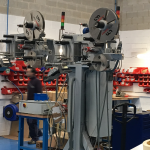The company based in Zamudio develops equipment to solve interoperability problems between manufacturers in fibre networks to the home
The history of the telecommunications sector firm GPONDoctor, based in Zamudio, is a clear example of business success based on specialization in high added value products and services. Similarly, it highlights the existence of ‘niche markets’ that are too small to attract the attention of large companies that manufacture test and measurement equipment, but sufficient to sustain innovative SME’s.
The origin in Tecnalia
In 2008, the three partners of the newly created company worked at Tecnalia. At that time, they began to develop a system able to determine the origin of interoperability problems that occur when devices from different manufacturers have to interoperate in a fibre optic telecommunications network. However, despite these problems, operating companies are interested in using devices from different manufacturers in order to avoid dependences from any of them.
The research and development work carried out gave rise to the first of the GPONDoctor brand analysers, which records failures and deviations of the device in relation to what is defined by the standard. In that sense, it is possible to determine the reason why an equipment is not working in a correct way and it is possible to provide to its manufacturer the necessary information to correct it. Since its development, Tecnalia has owned this equipment, but over time, three of the employees involved in its production acquired the rights to exploit and commercialize it. “We then began to play a role that was not usual in a technology centre – says Roberto Trueba, one of the promoters of GPONDoctor – and that led to the creation of a company; that is how the project was born”.
New services
Once GPONDoctor was established as a cooperative in 2016, the knowledge of technology has allowed its promoters to offer a range of specialized services that they offer to their clients in the market. These services vary depending on the type of client and the phase in which each one is in the process of adopting fibre-to-home network technology.
GPONDoctor works for telecommunication companies such as Telefónica, Portugal Telecom, China Telecom or Telekom Malaysia and also for hardware equipment manufacturers such as Huawei or Alcatel. The market for equipment and services developed by the Zamudio firm is estimated to be able to generate worldwide a turnover of between six and eight million euros per year. “Actually, since it is not a very large market, big companies are not interested in getting involved, what offers an opportunity to small companies like ours. Furthermore, as the equipment has a lot of added value because it requires a lot of investment in R&D, not any kind of company can enter either”, indicates Trueba.
Supports
Business success has not made GPONDoctor promoters forget the support they have received and that allows them to enjoy the position they have in the market today. “We are very grateful for the support received, both from the Administration, which has really helped us, and from Tecnalia, which bet on the project; and also from the clients who have trusted in our know-how. We are also happy for having decided to undertake, to work in a field that we like and that we control as experts, and to be able to return to society the economic resources that the society has contributed to us”, says María Alejandro, founding partner of the company.
“We consider essential – she continues – the public support provided by Basque institutions to promote the development of R&D. In fact, our team has been developed thanks to funds coming from the Emaitek Program of the Basque Government, to Seed Capital and to the support for internationalization offered by the Biscay Provincial Council. Currently, Enrique Areizaga, founding partner, is in Boston, in an intensive acceleration program at the Cambridge Innovation Centre, thanks also to the support of the Biscay Provincial Council. If there were no aid it would be very difficult to embark on business ventures. We also believe that the current orientation of aid towards the empowerment of incubators that promote the creation of companies that later revert resources to the innovation ecosystem is the most appropriate line. It is logical that the companies that benefit from this public money will then return it to society via taxes”.




